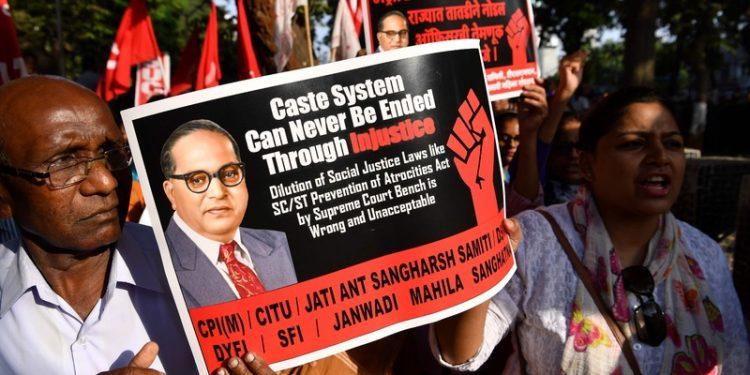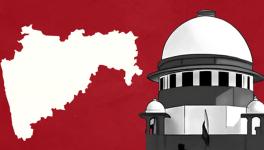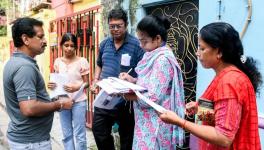Supreme Court in Hitesh Verma Case Fails to Address Caste Discrimination

The Supreme Court’s narrow interpretation of the term “within public view” in determining caste-based insults ignores the lived realities of members of Scheduled Castes and Scheduled Tribes, and defeats the purpose of the law, says KAILASH JEENGER.
——-
Recently, in Hitesh Verma v. State of Uttarakhand, the Supreme Court reiterated its strict position on the meaning of the words “in any place within public view” of the Scheduled Castes and the Scheduled Tribes (Prevention of Atrocities) Act, 1989.
In this case, the victim in her FIR alleged that six persons from a (so-called) upper caste had illegally entered her house and threatened her with dire consequences. Using casteist remarks, they took away construction material and said, “you are from a bad caste and that we will not let you live in this area.”
The court held that since the victim, who belongs to Scheduled Caste (SC), was abused within the four walls of her house, it does not satisfy the test of “in any place within public view”. Consequently, the court quashed the charge-sheet to that extent.
Can the Supreme Court determine a case that is at trial stage?
The trial court had framed charges under the laws, and the same was challenged by the accused before the High Court. But, the High Court maintained the charges and dismissed the petition.
However, the Supreme Court bench at a pre-trial stage ruled that casteist slurs and abuses made to a scheduled caste woman within the four walls of her house, and in the presence of her workers, does not amount to an offence under Section 3(1)(r) of the Act.
The bench appeared to be more concerned with what happens in public but is not at all affected by what happens deep inside the mind and heart of the victim. It is a crucial moment like this when the importance, but critical absence, of lived experiences and caste-sensitisation on the part of judges, is realised the most.
At the outset, I emphasise that the High Court and the Supreme Court were dealing with the matter at a pre-trial stage. The commission of the alleged act “in any place within public view” is a question of fact and thus can be determined by trial only. Moreover, there was no abuse of the process of law apparent on the face of the record. Similarly, the instant case does not fall in nor resemble with any of the circumstances justifying exercise of inherent powers of the High Court as laid down in State of Haryana v. Bhajan Lal. Therefore, quashing the charge under Section 3(1)(r) at a pre-trial stage is erroneous.
The bench also relied upon its earlier judgment in Swaran Singh (2008) which says that an offence under the Act is made out only if casteist remarks are made at any place (public or private) in the presence of members of public, other than relatives or friends of victim. According to Delhi High Court, ‘Members of public’ here refers to independent and impartial persons.
The words “within public view”, as used in Sections 3(1)(r) and 3(1)(s) of the Act, and its interpretation are seriously problematic.
Supreme Court failed the lived-realities of Scheduled Caste members
The bench, comprising three upper-caste male judges, overlooked the insult, humiliation, fear, waves of inferiority and persistent threat one feels subsequent to such an incident.
The law was enacted to protect the SCs and STs against actions inspired by such an iniquitous mindset only, but the court confined its views to the bare provision utterly disregarding the intent and purpose of the legislation.
The bench appeared to be more concerned with what happens in public but is not at all affected by what happens deep inside the mind and heart of the victim. It is a crucial moment like this when the importance, but critical absence, of lived experiences and caste-sensitisation on the part of judges, is realised the most.
According to the court’s reasoning, the provision is not attracted despite the fact that someone intentionally targets the other person’s caste. The former realises fully well that they belong to a higher caste and the latter comes from a lower caste in the hierarchical Indian social structure, due to which they find it very convenient to subject the latter to harassment and humiliation.
The law was enacted to protect the SCs and STs against actions inspired by such an iniquitous mindset only, but the court confined its views to the bare provision utterly disregarding the intent and purpose of the legislation.
The absurd interpretation suggests that there is no insult or humiliation if aspersions in the name of caste are made in the presence of relatives or friends as if someone’s dignity matters towards strangers only.
The law was enacted realising that members of SCs and STs still remain vulnerable in Indian society. They are subjected to various offences, indignities, humiliations and harassment.
The Statement of Objects and Reasons of the Act, emphasises that when SCs and STs assert their rights and try to improve their conditions, the same is not taken very kindly by the upper-castes. Thus, this piece of legislation was specially enacted to protect them against those terrible acts which are intentionally committed to demean and harass them with the knowledge that the other person belongs to a SC or ST community.
Casteist insult has the same effect in both private and public
The absurd interpretation suggests that there is no insult or humiliation if aspersions in the name of caste are made in the presence of relatives or friends as if someone’s dignity matters towards strangers only.
Moreover, the term friend remains legally undefined and, therefore, a wider interpretation of the same may benefit the culprits and prevent the application of Sections 3(1)(r) and 3(1)(s).
Further, given the immateriality of the presence of friends or relatives, these words make the provision weaker than the offence of defamation. This reductionism, of course, protects the perpetrators, instead of the victims.
The humiliation or abuse of an individual belonging to the SCs or STs by the name of their caste, even in the absence of members of the public, is a violation of the fundamental right to live with dignity under Article 21 of the Constitution.
These impugned words and their interpretation have the effect of reducing the gravity of the provision. They render the element of intention (mens rea) futile, which is, otherwise, a crucial ingredient constituting an offence.
Further, given the immateriality of the presence of friends or relatives, these words make the provision weaker than the offence of defamation. This reductionism, of course, protects the perpetrators, instead of the victims.
There is no intelligible difference between the wrongs committed at a place within public view and at a place not in public view. In both cases, an accused carries a guilty intention and the victim experiences humiliation. Further, the classification does not have a rational nexus with the object of the Act, which is to prevent the incidents of atrocities and provide relief to the victims.
Due to the presence of “within public view”, Sections 3(1)(r) and 3(1)(s) do not pass the twin-tests of a reasonable classification under Article 14 of the Constitution.
There is no intelligible difference between the wrongs committed at a place within public view and at a place not in public view. In both cases, an accused carries a guilty intention and the victim experiences humiliation. Further, the classification does not have a rational nexus with the object of the Act, which is to prevent the incidents of atrocities and provide relief to the victims. Rather, it frustrates the same. Hence, the impugned words render the provisions violative of Article 14.
The Act has been amended quite a few times to make it stricter because the reported (and unreported) cases of atrocities are on the rise according to the NCRB data and reports of the UN Committee on the Elimination of Racial Discrimination. However, the court disregarded these realities. Consequently, such judgments dilute the relevance and impact of the Act.
Thus, the expression “within public view” and its interpretation, both are contrary to the intention of the legislature and the Constitutional guarantees. They benefit the accused and those who already dominate the power structures. In fact, given the interpretation by the apex court, the incidents of caste-based insults and humiliation within the four walls are likely to increase. Therefore, the expression “within public view” must be omitted from Sections 3(1)(r) and 3(1)(r) (s) of the Act by an amendment.
(Kailash Jeengar teaches at the Faculty of Law, University of Delhi. The views are personal.)
The article was originally published in The Leaflet.
Get the latest reports & analysis with people's perspective on Protests, movements & deep analytical videos, discussions of the current affairs in your Telegram app. Subscribe to NewsClick's Telegram channel & get Real-Time updates on stories, as they get published on our website.
























